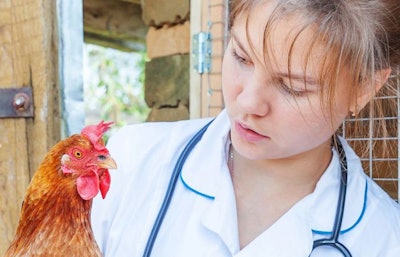
With record numbers of qualified veterinarians leaving practice over recent years, and a sharp reduction in those joining the profession, the U.K. is facing a severe shortage of veterinary professionals.
As a result, animal welfare and food safety could be put at risk, the Food Standards Agency (FSA) warns. It says that veterinarians play a vital role in the delivery of official controls.
Among the key factors leading to a shortage of veterinarians identified by FSA are the coronavirus (COVID-19) pandemic, the U.K.’s leaving the European Union (Brexit), rising demand for Export Health Certification, and the growth in pet ownership.
So far, the FSA says it has been able to carry out the necessary official controls.
However, without sufficient qualified and trained official vets, slaughterhouses will not be able to operate, it says. That could damage the nation’s meat industry, which is worth GBP9 billion (US$10.2 billion).
“We are working with partners to find solutions to what is a systemic resourcing issue so that the FSA can continue to provide a reliable service to industry and uphold food safety, protect animal health and welfare, and enable businesses to sell food domestically and abroad,” said Junior Johnson, FSA’s director of operations.
In order to identify solutions, FSA is seeking feedback from abattoirs and primary processing facilities on changes it is proposing to overcome these challenges.
Committee highlights shortage of official vets
FSA’s latest proposals followed shortly after the Public Accounts Committee highlighted the shortage of vets to monitor animal welfare and food safety in U.K. slaughterhouses. Findings were published in a recent report titled “Regulating after EU Exit.”
Main role of the Public Accounts Committee is to examine value for money of Government projects, programs, and service delivery. In doing so, it holds government officials to account for the economy, efficiency, and effectiveness of public spending.
According to Committee Chair, Dame Meg Hillier, the nation's businesses are still being impacted, and consumers put at risk six years after the vote that took the U.K. out of the EU.
She blamed the situation on poor preparation and planning by the government and the realities of global politics. These aspects, she said, have led to a failure to achieve trade agreements, as well as repeated delays in implementing a new import regime in order to replace the trading arrangements previously in place through EU membership.
In response to announcements of planned headcount reduction of up to 40% across government, Dame Meg warned that changes to legislation will be required so that regulatory models are sustainable.
Meat processors struggle to recruit workers
Labor shortages at slaughterhouses and processing plants also include other skilled workers, according to the British Meat Processors Association (BMPA).
Earlier this month at the Conservatory Party annual conference, Home Secretary Suella Braverman called for UK industries to train their own workers from the local population.
This is not a practical solution, according to the BMPA. It cited the low level of unemployment, particularly in rural areas, and the preference of many workers to obtain employment in other sectors.
“If the government wants to nurture a robust and secure domestic food supply chain, they will need to accept that a proportion of vacancies will need to be filled by foreign workers who are prepared migrate to where the work is,” according to the BMPA.
Call for urgent action on medicine supply to Northern Ireland
At an event last week, risks ahead to animal health and public health were also highlighted for Northern Ireland.
These issues were blamed by president of the British Veterinary Association (BVA) Malcolm Morley on costly bureaucracy, the threat of onerous regulation, and border checks. These are rooted in Northern Ireland’s unique position under the regulatory systems of both the EU and the U.K.
As a result of post-Brexit regulation, Northern Ireland vets are facing shortages of veterinary medicines, he said.
According to Morley, the Northern Ireland Protocol proposes that each batch of medicines entering the territory will need to be tested by the marketing authorization holder. The holder will have to be based either in Northern Ireland or the EU.
Currently in place is a grace period, which postponed this requirement. However, this period ends at the close of this year.
With no solution yet in sight, Northern Ireland faces the prospect of losing around half of the products currently available for farm animals and pets, said Morley.
Looking ahead, Morley warned it is possible that medicine companies will opt not to go to the effort and expense of registering new products in Northern Ireland.
In July, Northern Ireland Agriculture Minister Edwin Poots, farmers and veterinary organizations were already calling on the U.K. and EU to resolve the issues over the future supply of veterinary medicines to Northern Ireland.
.jpg?auto=format%2Ccompress&fit=crop&h=167&q=70&w=250)














